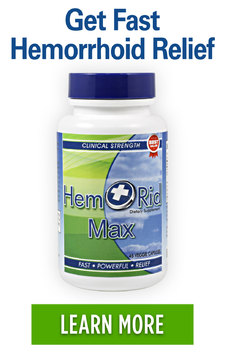Hemorrhoid Coughing Issues - Can Coughing Cause Hemorrhoids?
Posted on 06 December 2018 by Maryanne Johnson
Share this post
Can a cough really cause a hemorrhoid? You might be dismayed to learn that yes, that forceful, persistent cough you have, it can cause hemorrhoids.
It can be surprising to discover how sensitive your lower rectal veins are and what can trigger hemorrhoids to develop. The lower rectum is always in need of a steady supply of rich blood and uses it for a variety of functions.
Sexual arousal and stimulation require an uninterrupted blood flow, as well as passing stools, and other necessary duties. Blood flow during labor and pregnancy becomes imperative for expecting mothers.
Does Coughing Aggravate Hemorrhoids?
But there the second the blood flow is compromised or restricted, the venous channels react negatively, becoming inflamed, resulting in the development of hemorrhoids.
Coughing can be responsible for restricting and inhibiting rectal blood flow. You might not think about it, but when you cough and sneeze, your rectal veins and muscles react. Too much, and it could aggravate them, causing inflammation and swelling.
The hemorrhoidal tissue swells bring on symptoms that are equal parts painful and annoying. Itching, burning, anal discharge, lumps that form near the anus, are all commonly experienced by someone with hemorrhoids—even mild cases.
Will Coughing Make Hemorrhoids Worse?
Coughing fits, especially when they are forceful, puts increased pressure on the lower rectum, forcing the anus to swell and develop hemorrhoids.
Hemorrhoidal inflammation typically only lasts for a few days or a week at most. Coughing can be the cause, and it could make the symptoms feel worse.
Continuous coughing can make the hemorrhoids linger for longer, and yes, it could worsen your flare-up. Excessive and violent coughing can be a reoccurring cause of hemorrhoid flare-up, so if you don't resolve your cough, you could be seeing hemorrhoids form again.
Of course, there could be another risk factor in combination with hardy coughing that could be causing frequent or prolonged hemorrhoid flare-ups.
If you have a sedentary lifestyle and find yourself sitting (and coughing) for long periods of time, this too could be a driving factor.
Tackle your cough, and the hemorrhoids will take care of themselves. If you feel as if you have tried every medicine under the sun, then it is time
How to Avoid Aggravating Hemorrhoids
Like we discussed earlier, rectal veins are sensitive, and along with your coughing fits, there could be other risks that heighten your chance of developing hemorrhoids.
Learning about the common causes of hemorrhoids can help you decipher how to approach preventing flare-ups. There are a few that are out of your control, but lifestyle and diet can be slightly altered to lower the risk of hemorrhoids.
Risk factors that aggravate and cause hemorrhoids include:
- Coughing and sneezing
- Heavy lifting
- Sitting for long periods of time
- Lack of exercise and hydration
- Lack of fiber
- Constipation and chronic diarrhea
- Ignoring the need to have a bowel movement
- Pregnancy, labor, childbirth
- Being age 45 and up
Research has shown that a conservative preventative approach to hemorrhoids is often the most effective. By changing diet and lifestyle to healthier ones, it lightens the pressure and restriction on the rectal veins.





0 comments